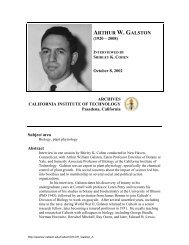Interview with Thomas A. Tombrello - Caltech Oral Histories
Interview with Thomas A. Tombrello - Caltech Oral Histories
Interview with Thomas A. Tombrello - Caltech Oral Histories
Create successful ePaper yourself
Turn your PDF publications into a flip-book with our unique Google optimized e-Paper software.
<strong>Tombrello</strong>–102<br />
ASPATURIAN: Evidently not.<br />
TOMBRELLO: But at the end of the day, as I say, it doesn’t mean you’ve really accomplished<br />
anything. So, anyway, Schlumberger. They began to monkey <strong>with</strong> the budget a little bit after<br />
the first year, and I complained. They didn't really cut it. They may have cut it a half a percent.<br />
[Laughter] I mean, compared to the fluctuations in federal grants at universities, it was noise.<br />
But I had to put up a show of saying how disappointed I was in them—how this was unfair, this<br />
wasn’t part of the agreement. They felt they had to do it. OK, they got away <strong>with</strong> it. But then,<br />
by somewhere in the middle of the second year, they began to dabble a bit more. And then they<br />
said, “Are you going to leave us?” I said, “I haven’t decided yet.” “Well, when are you going to<br />
tell us?” I said, “When I get ready.” [Laughter] I said, “I have a contract, you know.” So<br />
eventually, I did decide. I had learned a lot of things from the experience. Actually, I missed<br />
being at <strong>Caltech</strong>. I missed the students.<br />
I had the equivalent of students at Schlumberger. I have a story about that. The previous<br />
director had done something brilliant. He hired a guy named Bob Burridge, an applied<br />
mathematician from Courant Institute at NYU. I asked Burridge why he had come to<br />
Schlumberger, and he said, “You know, I never really had many students at Courant, and there<br />
are all these young people here in the lab.” Then he said, “I’m in the geophysics department, but<br />
I’d really like to report to you.” I said, “Well, Bob, you’re probably one of the most senior and<br />
distinguished scientists here. I could put up <strong>with</strong> that, but there’s a price.” He said, “Well,<br />
what’s the price?” I said, “Ah, the price is the following: I may pick out some young scientist in<br />
the lab. And I will say, ‘Bob, I’d like you to work <strong>with</strong> that person for maybe six months, on a<br />
problem of your choosing, his choosing. You work together.’” He says, “Hey, that sounds<br />
wonderful to me. Not much of a price.” I said, “At the end of the six months, I’m going to have<br />
you come in and talk to me very candidly about how this person is doing, what their promise is,<br />
the rest of it.” He says, “Well, that’s what professors do.” I said, “Fine; I’ll arrange it today that<br />
you’re reporting to me. I want you to keep your office, because you’re an asset to the geophysics<br />
department, but at the same time you’re reporting to me, and remember the price.”<br />
Then I would find somebody who I thought was bright enough but who I had a feeling<br />
would not necessarily have a long-term future, and who was going to hit a ceiling at some point.<br />
And so I’d say, “Bob, why don’t you work <strong>with</strong> Jorge?” “Oh, yeah, he’s an interesting guy.”<br />
http://resolver.caltech.edu/<strong>Caltech</strong>OH:OH_<strong>Tombrello</strong>_T

















